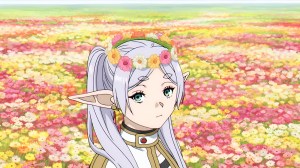In the world of anime, there are some basic things new fans need to know. For instance, if you see a character with colorful hair, then you can bet they are the show’s lead.
Videos by ComicBook.com
If two characters sit beside each other at school, assume they will start dating.
At any moment, expect boys to get a nosebleed when pretty girls walk by them.
There are hundreds of inside references and jokes scattered around the anime industry. If you are looking to get into the fandom, then you will want to take everything one step at a time. At such, ComicBook.com is here to help you with the language aspect of anime. So, here are ten words any anime fans should absolutely know.

Otaku
In Japanese, the word ‘Otaku’ is roughly equivalent to the English words ‘nerd’ or ‘geek.’ The term isn’t a bad one and is often used to the U.S. to refer to people who are particularly fond of anime, manga, and even cosplya.

Weeaboo
Unlike ‘Otaku,’ you should be offended if anyone ever calls you a weeaboo. The term is a more derogatory one which implies a person is more than a fan of anime; Instead, they are obsessed. Rather than just enjoying anime, fans criticize weeaboos for fetishizing Japan’s culture as a whole.

Baka
Simply put, ‘Baka’ is the Japanese term for ‘Idiot.’ If you have any plans to watch a shonen series, you will undoubtedly hear this phrase from many of the show’s female leads.

Senpai
For those of you confused by the ‘Notice Me, Senpai’ meme, then you will soon understand. In Japan, the world ‘senpai’ is used to refer to an older person, upperclassmen, etc. Many shojo anime series see leads fall for older men, so the term is used by girls when they want to grab their crush’s attention.

Ecchi / Hentai
Hopefully, you’ll only become familiar with these terms when you have come of age. In Japan, the term ‘Ecchi’ is a world used to define anime that is sexually driven without any explicit scene. ‘Hentai’ is used to describe perverts and refers to more explicit anime. So, if you know anything about the birds and the bees, then you will already have a clue as to what these shows entail.

Tsundere
In Japan, the term ‘tsundere’ is a popular one as it refers to a type of style for men. If a person is described as such, it means they are outwardly cold but eventually warm up to others. Many male leads in shojo are depicted as being tsundere, and the heroines just can’t get enough of their cold glances.

Kawaii
In anime, you’ll hear this phrase again and again. ‘Kawaii’ in Japanese means cute or adorable in English. So, if a character happens to see a stray cat, you can expect them to squeal about them being kawaii.

Fan Service
Despite its controversial status, fan service is a part of life for many anime fans. The term refers to the gratuitous sexualizing of both male and female characters. Anime series like Free! Iwatobi Swim Club and High School DxD are two popular shows which often use fan service.

Harem
If you hear about a harem anime, don’t immediately assume it is for adults only. There are plenty of harem anime series which audiences of all ages can watch. The term simply refers to a show that has one male lead and a plethora of potential female suitors of fall for him. There is also the Reverse Harem subgenre which sees a singular female flooded with male suitors.

Urusai
In anime, you know a fight is about to go down if you hear a word like this. ‘Urusai’ in Japanese tells someone to quiet down, but it doesn’t do so politely. In English, it is more equivalent to ‘shut up.’ Many shonen anime series use this phrase to rev up tension between fighters, and they don’t care to control their volume when doing so.









